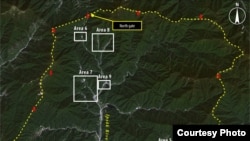LONDON —
Human rights group Amnesty International says torture and executions are widespread in political prisons in North Korea that can be the size of large cities. Amnesty used new satellite photos and testimony from former guards and inmates to compile its report.
Amnesty International said North Korea’s biggest camp for political prisoners, known as Kwanliso Prison Camp 16, stretches across 560 square kilometers, three times the size of Washington D.C. It is thought to house 20,000 prisoners.
A former prison guard, identified only as Lee, told Amnesty about conditions in the camp.
Lee said the purpose of prison camps is to oppress, degrade, and violate the inmates for as long as they are alive. The prisoners are only humans insofar as they can speak. However, in reality they are worse off than animals, he said.
The testimony offers just a glimpse of the horrific scale of human rights abuses being carried out in the country, said Amnesty International’s East Asia Researcher Rajiv Narayan.
“They have witnessed public executions. We know that torture is rampant. They have all seen deaths due to malnutrition. Everyone is forced to work from dawn to dusk. The security official also told us of cases of rape. Women being raped and also disappearing,” said Narayan.
Kim Young-soon, who survived nine years at another prison, Camp 15, recalls seeing a public execution.
She said the prisoner is first beaten half to death, then tied to a pole up on a platform, with his hands tied behind his back. His feet are also tied, another rope is tied around his waist, and he is blindfolded, she said. Then, one guard shouts to the firing squad, “In the name of the people, shoot the enemy of the revolution!”
There are thought to be four such camps in North Korea holding 100,000 prisoners.
Amnesty shared its evidence with the U.N. Commission of Inquiry investigating human rights abuses in North Korea. Its chairman, Michael Kirby, spoke to VOA in October.
“The establishment of the Commission of Inquiry was a unanimous act of the Human Rights Council. And no vote was called for. That is a new development and an unusual one in the world community and it shows that the international community on the whole is very worried and very disturbed about this, and out of that we hope action will follow,” said Kirby.
The inquiry’s report will be presented to the Geneva-based U.N. Human Rights Council in March. North Korea has called its establishment a ‘hostile political act’ and has not responded to accusations of human rights abuses.
Amnesty International said North Korea’s biggest camp for political prisoners, known as Kwanliso Prison Camp 16, stretches across 560 square kilometers, three times the size of Washington D.C. It is thought to house 20,000 prisoners.
A former prison guard, identified only as Lee, told Amnesty about conditions in the camp.
Lee said the purpose of prison camps is to oppress, degrade, and violate the inmates for as long as they are alive. The prisoners are only humans insofar as they can speak. However, in reality they are worse off than animals, he said.
The testimony offers just a glimpse of the horrific scale of human rights abuses being carried out in the country, said Amnesty International’s East Asia Researcher Rajiv Narayan.
“They have witnessed public executions. We know that torture is rampant. They have all seen deaths due to malnutrition. Everyone is forced to work from dawn to dusk. The security official also told us of cases of rape. Women being raped and also disappearing,” said Narayan.
Kim Young-soon, who survived nine years at another prison, Camp 15, recalls seeing a public execution.
She said the prisoner is first beaten half to death, then tied to a pole up on a platform, with his hands tied behind his back. His feet are also tied, another rope is tied around his waist, and he is blindfolded, she said. Then, one guard shouts to the firing squad, “In the name of the people, shoot the enemy of the revolution!”
There are thought to be four such camps in North Korea holding 100,000 prisoners.
Amnesty shared its evidence with the U.N. Commission of Inquiry investigating human rights abuses in North Korea. Its chairman, Michael Kirby, spoke to VOA in October.
“The establishment of the Commission of Inquiry was a unanimous act of the Human Rights Council. And no vote was called for. That is a new development and an unusual one in the world community and it shows that the international community on the whole is very worried and very disturbed about this, and out of that we hope action will follow,” said Kirby.
The inquiry’s report will be presented to the Geneva-based U.N. Human Rights Council in March. North Korea has called its establishment a ‘hostile political act’ and has not responded to accusations of human rights abuses.












